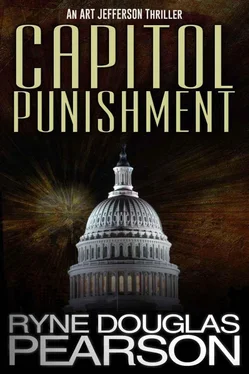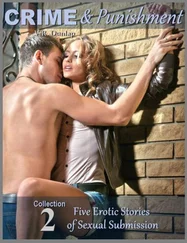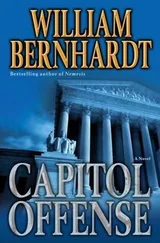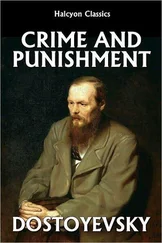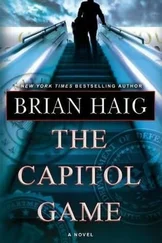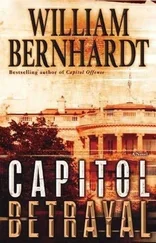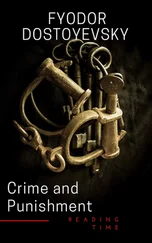“Jefferson. Good to see you.” Coventry shook the agent’s hand and took his overcoat. It was dry outside, but cold and breezy. “Did the guard dogs give you any trouble?”
Art noticed the smile attached to the inquiry, but doubted that the two Secret Service agents who’d given him the once-over out front would appreciate the secretary’s characterization. “Just doing their job, sir.”
“I know. Come on in.” Coventry led the evening’s final arrival into the main area of the foyer. A long, sweeping staircase curved up to the left, forming an arch over the passageway to the back of the house. To the right was a parlor, and beyond it a dining room. To the left, through twin doors that were open, was the secretary’s study, and the gathering.
“This is a nice house, sir,” Art commented. Nice, big. It was definitely beyond his means, but soon there would be another set of means to add to his. And he would have to start looking for a new place. Correction , he caught himself… they would be looking.
“Thanks,” Coventry answered, bringing Art into the study. Bud DiContino and Gordon Jones stood to greet him. “You know this fella.”
“Mr. Director.” There was no way around the formality, Art knew. Mister this, mister that. All evening.
“Glad you could make it, Jefferson,” Jones said.
“And you’ve met Bud DiContino.”
“Yes. A couple years back.”
“Good to see you again,” Bud said, shaking the agent’s hand.
“Have a seat, Jefferson,” Coventry offered. “Take your jacket off. You want a beer?”
Oh, wonderful! He was being told to get comfortable and have a brew in front of the director! Art could see it was a loose-tie and rolled-up sleeves night, but he had a gun on his hip — although Jones did, too, and his Smith & Wesson was there for all to see.
“Relax, Jefferson,” Jones suggested with an amused smile. “Consider it a night off.”
“Yes, sir.”
“Beer?” Coventry asked again as Art hung his jacket with the others.
“Do you have any nonalcoholic stuff?”
“One light-light coming up.”
Art took a seat next to the national security adviser on one of the room’s two couches. Two chairs completed the U around the coffee table, and at the far end, built into a large display case that held some of the secretary’s memorabilia, was a good-sized TV.
“I wish you were in D.C. under better circumstances,” Bud commented.
“To be honest, I try not to find many circumstances to be in D.C.”
Bud smiled and looked to a grinning Jones. “He knows the first rule of surviving this place, Gordy: stay away!”
Jones chuckled quietly. He wasn’t a man given to overt laughter. “So, Jefferson, the word is you’re going to Chicago.”
“I called Bob Lomax yesterday and accepted.”
“What’s this?” Bud asked.
“Jefferson is going to be the new assistant special agent in charge of the Chicago field office,” Jones explained. He looked back to the agent. “You’ll like Lomax.”
“I worked with him in Chicago about a dozen years back,” Art said nodding.
Clinking bottles announced the secretary’s return. He handed Art a bottle, and the second round to the others, then sat in one of the chairs. Jones was next to him in the other.
“Good seats, gentlemen,” Coventry observed as the TV picture showed a filling House chamber. “Bud says you have someone there in the guest box?”
“Yes, my…” Well, she’s not really your girlfriend anymore. “…fiancée.”
“Congratulations, Jefferson,” Coventry said.
“A new job, a new wife,” Jones commented.
Bud lifted his long neck. “To a successful marriage and warm winters in Chicago.”
Art lifted his bottle with a wide smile. “Hear! Hear!”
* * *
The Volvo had been ditched in favor of a brand-new minivan whose owner wouldn’t miss it for a few hours yet. Darian was behind the wheel, easing it carefully north of the Leesburg Pike. In the back, Moises and Mustafa were making final preparations.
“How long since you’ve fired that?” Darian asked.
Mustafa swung the front of the break-open M79 grenade launcher upward, closing the breech-loaded weapon and making it ready to fire. In its chamber was a 40mm fragmentation round, and affixed to the bandolier slung across his chest were eight more. “About six months. But you never forget, Brother Darian.”
“Good. You know what to do.” Darian looked to Moises in the rearview. He sat straight in the second bench seat, the headlights from oncoming traffic washing pale over his face. “We’re almost there, Brother Moises. You ready?”
Moises looked straight ahead, his hands tight on the Ingram, and only nodded.
Fire . Darian saw it in the stare. Saw it on the face. A fighter had been born.
* * *
The metal detectors were four wide for House and Senate members, and were located just off Statuary Hall to the south of the grand rotunda. Begrudgingly, the elected representatives of the citizens of the United States had accepted this “indignity” after stern warnings by leaders of both political parties, but the lines were slowed by secondary checks after keys and various other items set off the sensitive instruments.
“Can you believe this?” Congressman Cal McCrary asked, as he and his fellow representative from the Commonwealth of Massachusetts inched closer to the portals manned by the Secret Service.
“Ridiculous,” Congressman Richard Vorhees agreed, the discomfort in his knee transferring more to his face as time wore on.
“Sore tonight, Dick?”
“Tonight, today, tomorrow, next week. Until I get a new leg.”
“Count your blessings, my man,” McCrary said. “You were lucky.” He checked the shade of his surroundings. “I think they enjoy killing middle-aged white men despite the statistics. Thank goodness yours was a lousy shot.”
“He didn’t want me chasing him,” Vorhees explained. “It was no accident he shot me in the leg. I’m just glad he picked the one made of plastic and steel.”
“Flesh and bone are expensive to replace, eh?”
“Don’t I know it?”
The mass of bodies became lines nearer the metal detectors. Vorhees followed McCrary through, and, as he expected, set off the buzzers. “Down here.”
A senior Secret Service agent, aware of the congressman’s condition, stepped forward. “We’ll just wand you, sir.”
Vorhees lifted his arms, letting the agent run the metal detecting wand up and down both sides of his body. The only reaction was from the prosthetic limb.
“Okay, sir. Go on in.”
Vorhees nodded and continued on, entering the House chamber just as the networks were throwing their “Presidential State of the Union Message” graphics up for a nationwide audience.
* * *
John Barrish sat with his youngest boy in front of the TV. Louise Barrish was nowhere to be seen.
“There he goes,” Stanley said at the sight.
John said nothing, but wore an uncharacteristic broad smile. It was no coincidence that this formed as the somewhat less than cheerful Congressman Richard Vorhees took his seat in the fourth row. “What time is it?”
Stanley looked at his watch. He knew what his father wanted to hear. “He should be doing it now.”
Sixty miles away, Toby Barrish was hanging up the pay phone at a truck stop just off Interstate 66, leaving a confused and alarmed 911 operator talking to a dial tone.
Article II, Section 3, of the Constitution of the United States of America charges the President with the responsibility of, from time to time, reporting to the Congress on the state of the union. That seemingly simple obligation had developed over the years into a pivotal time for many presidents, an occasion when their legislative agendas and special programs for the coming year were to be presented to both houses of Congress. With the coming of television coverage of the State of the Union message, image was thrown into the mix of factors deemed important. Combining that with the general seriousness of a constitutionally required address, there was a choreographed quality to the event.
Читать дальше
